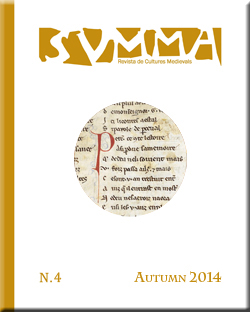The Origins of the Herald of Arms in Literature and the Earliest War Songs of Bertran de Born (1181-1183)
DOI:
https://doi.org/10.1344/Svmma2014.4.5Abstract
The depictions of the herald of arms that Chrétien de Troyes or the Histoire de Guillaume le Maréchal provide do not seem to suggest any kind of relationship between these non-conformists and the lord troubadour Bertran de Born.Yet, in his earliest songs of war, he performs a somewhat similar function when the Count of Toulouse and the heir of the King of England ask him to be their spokesman to call upon their potential allies for the combats ahead. The poet-soldier spares no argument to convince them, explains the situation with clarity and brings out the interest and the glory they will find in it.
At any rate, besides the fact that the rank of the lord of Hautefort does not place him in a position of total dependence, his state of mind is far away from any kind of servility: his awareness of his moral and literary value prompts him to embrace an aristocratic ideology based on the chanson de geste above all things, and he claims for himself the right to criticize any lord, even any king, who neglects its rules, even if he pays for it dearly.
Downloads
Published
2014-12-21
Issue
Section
Articles
License
Copyright (c) 2015 Gérard Gouiran

This work is licensed under a Creative Commons Attribution-NonCommercial-NoDerivatives 4.0 International License.
The authors retain rights and grant the journal right of first publication of the work.
The author (s) to retain the publishing rights without restrictions, only recognition of first publication.
SVMMA Revista de Cultures Medievals is licensed under a Creative Commons Attribution-NonCommercial-ShareAlike 3.0 Spain License















